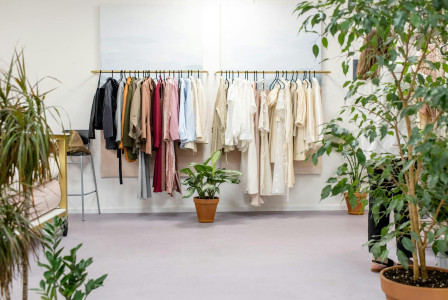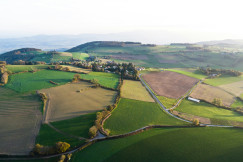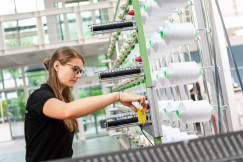Projects
27 August 2025
The CLOTH project: Building a cross-sector alliance for green and digital fashion
Projects
27 August 2025
Ecosystem's readiness to support EU strategic autonomy and defence efforts
Infrastructure
Investments and funding
+14 more
Login / create an account to be able to react
-
51

The CLOTH project, formally titled CLuster Alliance fOr the Transition to green and digital fasHion, was funded under the EU’s COSME programme for the Competitiveness of Enterprises and SMEs. It ran from February 2022 to January 2024 and created a cross-sectoral cluster alliance to support SMEs in transitioning to greener and more digital business models in the fashion industry.
Topics
Albania
Armenia
Austria
Belgium
Bosnia and Herzegovina
Bulgaria
Croatia
Cyprus
Czechia
Denmark
Estonia
EU-27
Finland
France
Georgia
Germany
Greece
Hungary
Iceland
Ireland
Italy
Kosovo
Latvia
Liechtenstein
Lithuania
Luxembourg
Malta
Moldova
Montenegro
Netherlands
North Macedonia
Norway
Poland
Portugal
Romania
Serbia
Slovakia
Slovenia
Spain
Sweden
Switzerland
Türkiye
Ukraine
Other
Academic / Research and VET Institutions
Business Support Organisation
Company with 250 or more employees
Cluster Organisations
Consumer Organisations
Cultural and Heritage Organisations
Destination Management & Marketing Organisations
EU Institutions
Financial Institutions and Investors
Industry Associations and Chambers of Commerce
International Organisations
Local Authorities
Media / Journalist Organisations
National authorities
Networks and Federations / Confederations
NGOs / Non-profits
Notified Bodies
Regional Authorities
SMEs (a company with less than 250 employees)
Social Economy Entity
Trade Unions
Other
-
Transition Pathway's building blocks
-
-
Ecosystem's readiness to support EU strategic autonomy and defence efforts
-
Infrastructure
-
Investments and funding
-
R&I, techniques and technological solutions
-
Skills
-
Social dimension
-
Sustainable competitiveness
-
Regulation and public governance
-
-
Industrial ecosystems
-
-
Cultural and creative industries
-
Digital
-
Retail
-
Textile
-
-
Textiles ecosystem areas
-
-
Fibres, yarns and fabrics
-
Apparel and clothing accessories
-
Research and Innovation
-
Waste management, reuse and repair
-
Business support and Communication
-
Share
Introduction to the project
The CLOTH project, formally titled CLuster Alliance fOr the Transition to green and digital fasHion, was funded by the European Union’s COSME programme for the Competitiveness of Enterprises and Small and Medium-sized Enterprises (SMEs). It aimed to strengthen interregional cooperation in the fashion sector by creating a cross-sectoral cluster alliance that supports SMEs in their transition to greener and more digital business models.
The project ran from February 2022 to January 2024, with a total budget of €623 489,05. It was coordinated by Agrupacio Catalana del textile I de la moda in Spain and brought together a consortium of five partners from Spain, Bulgaria, Romania, Denmark, and France.
Project’s achievements
CLOTH focused on building a favourable ecosystem for innovation, sustainability, and competitiveness in the European fashion industry. It developed a long-term collaboration roadmap and launched a dedicated Fashion Platform to facilitating knowledge exchange among cluster members. This platform enabled the sharing of best practices, experiences, and strategic insights to foster a more competitive, sustainable, and innovative European fashion ecosystem.
Key achievements of the project include:
- The project implemented a total of 11 ClusterXchange missions. These short-term transnational exchanges enabled SMEs and cluster members to visit host organisations in other EU countries to learn, network and explore innovation opportunities. These missions took place in 8 countries with key fashion hubs such as London, Amsterdam, Milan, and Istanbul. In total, 79 visiting organisations participated in these exchanges. More information on this is available in the ClusterXchange guide.
- Capacity building efforts included 5 training sessions and 5 webinars, which were attended by 71 participants.
- A comprehensive mapping exercise identified fashion sector trends and challenges across the participating regions.
- The consortium conducted a study of complementarities among partners to identify synergies and define a common strategy for supporting SMEs in their transition to sustainable and digital business models.
- A programme of excellence services was designed to assist SMEs in areas such as digitalisation, circularity, and internationalisation.
Contribution of the project to EU objectives and the twin transition
CLOTH directly contributed to the EU’s twin transition by promoting both environmental sustainability and digital transformation in the fashion and textile sectors. It supported SMEs in adopting eco-friendly practices, improving resource efficiency, and integrating digital tools into their operations. The project aligned with the European Green Deal and the Circular Economy Action Plan, as well as COSME’s goals of enhancing cluster excellence and SME competitiveness.
Through its cross-sectoral approach, CLOTH brought together expertise from multiple industries connected to fashion: textiles, circular economy, creative industries, and digital technologies. This integration enabled the project to address key challenges holistically, such as overproduction, sustainable material sourcing, and consumer awareness. It encouraged collaboration between fashion businesses, universities, and industry associations to drive innovation and resilience.
European collaboration and knowledge transfer
Coordinated by a Spanish institution, CLOTH had a strong European dimension. The consortium included partners from Bulgaria, Romania, Denmark, and France, each contributing expertise from different value chains including fashion and textiles, circular economy, creative industries, and digital technologies.
This collaborative framework enabled extensive knowledge exchange and capacity building, strengthening the European fashion ecosystem’s ability to adapt to the challenges of the green and digital transitions. The project’s outcomes continue to support the transformation of the sector, offering a replicable model for cluster-based innovation and sustainability.
Comments (0)
See also
Welcome to the 'Certification and Communication’ Community workspace
- Categories
- Infrastructure Investments and funding R&I, techniques and technological solutions +26 more
Welcome to the Skills and Talent Community Workspace!
- Categories
- Infrastructure Investments and funding R&I, techniques and technological solutions +28 more
Summer Reading List 2025
- Categories
- Infrastructure Investments and funding R&I, techniques and technological solutions +28 more




